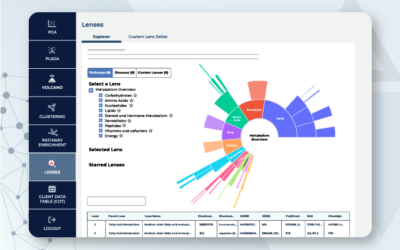Rare diseases encompass a heterogeneous group of life-threatening conditions ranging from digestive to autoimmune diseases. As of 2022, there are approximately 10,000 distinct rare diseases, and 400 million people worldwide are affected by a rare disease.1 Rare diseases are challenging to diagnose, which makes providing appropriate treatments in a timely manner extremely challenging. Many rare disease patients remain undiagnosed for years, and many even die without an accurate diagnosis.
Within the realm of rare diseases are conditions considered to be inborn errors of metabolism (IEM). Newborn screening (NBS) identifies infants with IEM that, if left untreated, would suffer severe clinical outcomes or death. IEM are rare genetic disorders that cause alterations or deficiencies in enzymes involved in metabolism. While individually rare, IEM occur in about 1 in 2,500 live births.2 However, a patient may exhibit clinical signs that do not map to specific disorders, or a traditional NBS panel may come back with no clues.
In these frustrating situations, clinical researchers and patients need more places to turn for answers. Metabolon offers a comprehensive approach to identifying rare diseases across multiple biochemical pathways by measuring hundreds of metabolites in a single sample.
Current Methods Do Not Identify All Rare Diseases
Approximately 4% of the world population is affected by a rare disease, but the actual number is likely much greater since current diagnostics only test for a few rare diseases. Furthermore, identifying the specific cause of a rare disease can take an average of seven years.1 During this time, patients can experience severe symptoms while the most optimal treatment for their condition is identified. Additionally, because many treatable IEM are not included on standard NBS panels, newborns with symptoms of an IEM could still require further testing, even when traditional NBS findings are normal.
Traditional diagnostic techniques rely on multiple targeted panels and numerous sample types to perform a comprehensive patient assessment and make a conclusive diagnosis across a broad array of rare diseases. Current NBS methods typically include three panels, targeting only 43 to 49 disorders.3 Unfortunately, a high cost is associated with multiple testing visits and visits to various specialists.
More comprehensive clinical tests to interrogate patient samples can be the key to identifying biomarker signatures, allowing clinicians to determine the correct diagnosis and prescribe the proper treatment. Untargeted metabolomics could detect multiple metabolites in a single test for the global analysis of metabolic perturbations.
Metabolomics Drives Identification of Rare Disease Signatures and Diagnoses
Metabolomics can identify biomarkers of disease for numerous rare diseases because it can examine the metabolic profiles of individual patients and link the changes to specific genetic mutations. This technology enables a quicker diagnosis of patients so they may initiate treatment quicker. There are hundreds of IEM diseases, and often the clinical manifestations of those diseases are vague, or the metabolic pathway that is disturbed is not immediately apparent. Applying untargeted metabolomics, where prior knowledge of the affected metabolic pathway is not required, provides advantages over targeted analytical approaches, and can extend the diagnostic potential of IEM screens beyond the 43 to 49 disorders currently evaluated in NBS programs. Metabolon’s technology delivers in-depth coverage of multiple pathways that can be altered in patients with IEM or other rare diseases by providing a comprehensive assessment of the metabolome. Rather than targeting these pathways and enzymes with single tests and collecting multiple samples, our untargeted metabolomics analysis expands the information available to clinicians to make quicker diagnoses in these patients.
For example, in a recent study published in the Journal of the American Medical Association, Metabolon’s platform was leveraged to screen over 2,400 samples from patients suspected of having a metabolic disease. The platform correctly identified biomarkers signatures in 128 cases and 70 metabolic conditions. 49 of these diseases are not tested for NBS in the United States. Several of the identified diseases are classified as neurometabolic disorders that traditionally use cerebral spinal fluid (CSF) as the diagnostic sample type. Metabolon’s technology identified biomarker signatures for these diseases in plasma, making it a less invasive approach for patients. The diagnostic rate of the platform was a several-fold increase over traditional diagnostics.
New Hope for Patients with Rare Diseases
Metabolon’s method of clinical metabolomics has been validated according to the regulations and standards set forth by the Clinical Laboratory Improvement Amendments (CLIA) and the College of American Pathologists (CAP). Our validated untargeted metabolomics platform can identify up to 1,000 biochemicals in blood. Therefore, these molecular changes are clinically significant as they provide the earliest indicators of disease progression and response to treatment. Applying our expertise to clinical metabolomics is just one example of how Metabolon reveals biological insights otherwise unseen through other technologies by leveraging our proprietary technology. We are unique in our ability to run liquid chromatography-mass spectrometry (LC-MS) metabolomics testing in a CLIA-certified and CAP-accredited laboratory and to provide impactful results based on a large number of metabolites measured in a single sample. Expanding metabolomics capabilities to NBS has enormous potential for researchers and patients alike. Biochemical signatures identified through our untargeted metabolomics technology provide indicators and a clearer path to clinical diagnosis with one screening test, whereas traditional diagnostic methods require multiple tests that may still not offer answers.
Disclaimer
This test was developed, and its performance characteristics were determined by Metabolon, Inc. It has not been cleared or approved by the U.S. Food and Drug Administration. Metabolon is regulated under the Clinical Laboratory Improvement Amendments (CLIA) and the College of American Pathologists (CAP) as an accredited laboratory to perform high-complexity clinical testing. Test results should be interpreted in conjunction with other laboratory and clinical data available to the clinician.
References
- Global Genes:RARE Disease Facts. 2022. https://globalgenes.org/rare-disease-facts/
- Lee KN, Uhlmann W, Hipp L, Quinonez SC. The diagnosis of inborn errors of metabolism in previously undiagnosed adults referred for medical genetics evaluation. Mol Genet Metab Rep. Dec 2020;25:100653. doi:10.1016/j.ymgmr.2020.100653
- Liu N, Xiao J, Gijavanekar C, et al. Comparison of Untargeted Metabolomic Profiling vs Traditional Metabolic Screening to Identify Inborn Errors of Metabolism. JAMA Netw Open. 07 01 2021;4(7):e2114155. doi:10.1001/jamanetworkopen.2021.14155





